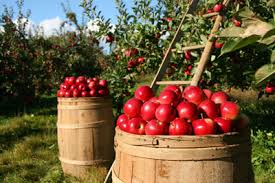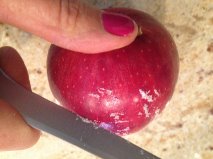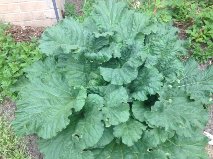What is that shiny wax coating on fruits and vegetables and is it safe? Many of my clients ask these two questions once they discover that many fruits and vegetables at the grocery store have a waxy coating on them.
Most fruits and vegetables make their own wax coating which helps to keep the moisture in since many are made up of 80-95 percent water. But this natural waxy coating comes off after produce is washed many times in order to remove dirt and soil before packaging. Farmers then apply a layer of wax coating to their non-organic fruits and vegetables to prevent moisture loss, protect from bruising, and increase shelf life.
So what is this wax and is it safe to eat?
There are multiple kinds of wax that can be used; carnauba wax (from the carnauba palm tree), beeswax, and shellac (from the lac beetle) are preferable to petroleum-based waxes, which contain solvent residues or wood rosins. Find out from your grocer what kind of wax is used on the fruits and vegetables. But it’s not just the wax that is a concern. It is also other compounds that are added to it – ethyl alcohol or ethanol for consistency or milk casein (a protein linked to milk allergy). Most likely this wouldn’t kill you, but why would you want to put it in your body?
 I recommend buying apples from markets and places where apples are grown if possible. The chances that the farmers have not waxed apples will be good there. It is also a better idea to buy the dull apples that are fresh, without any kind of artificial coating. More importantly, it is always a good practice to clean apples with lukewarm water thoroughly before eating. Also, you may use a paper towel with some vinegar (acetic acid) to wipe the apple before washing.
I recommend buying apples from markets and places where apples are grown if possible. The chances that the farmers have not waxed apples will be good there. It is also a better idea to buy the dull apples that are fresh, without any kind of artificial coating. More importantly, it is always a good practice to clean apples with lukewarm water thoroughly before eating. Also, you may use a paper towel with some vinegar (acetic acid) to wipe the apple before washing.
Unfortunately, the only way right now to remove the wax compound from your non-organic produce is to peel off the outer skin. Make sure to remove only a thin layer leaving in tact the many vitamins and minerals right below the skin.
Which fruits and vegetables are waxed?
Non-organic fruits and vegetables that are commonly waxed are:
- apples
- bell peppers
- cucumbers
- eggplants
- grapefruits
- lemons
- limes
- oranges
- parsnips
- passion fruit
- peaches
- potatoes
- pumpkins
- rutabagas
- squash
- sweet potatoes
- tomatoes
- turnips
- yucca
What about organic produce?
Organically grown fruits and vegetables do not contain synthetic (petroleum-based) wax coatings. So shopping at your local farmers’ market or roadside stand will be unwaxed and preferable. Starting your own garden is another option. I grow rhubarb (which comes back every year), lettuce, tomatoes, carrots, scallions, peppers, beans, and a variety of herbs in my backyard 5×10 plot and a few extra pots. It may sound intimidating, but really all you need is a small plot of land (or several containers), some healthy soil, and the will to do it.
To Your Health!





Debbie: Thanks for this informative article about waxes on fruits and vegetables. How wonderful to know that you can wash it off before eating with just soap and water. Thank you! Shera
Make sure these are organic produce, Shera. For non-organic fruit and veggies, you will have to peel them to get the wax off. To Your Health
Debbie: This is very interesting, do all non-organic fruit get added coating protection?
Thank you for this informative information that tells me what my body is saying. I have an intolerance to dairy, and never thought they would put it on veggies. Another thing I learned is they put soy wax on apples at my local grocers. I get eczema with soy and have been eating apples with juicing as well as on my salad. My neck and now my scalp are covered in eczema. Here I thought I was eating healthy, instead I was bringing harm to my body! I am having to have my naturopath test all my veggies. He found the soy. I think I should eat candy bars instead, probably healthier for me. Haha! Again thank you!
Thank you for this informative information that tells me what my body is saying. I have an intolerance to dairy, and never thought they would put it on veggies. Another thing I learned is they put soy wax on apples at my local grocers. I get eczema with soy and have been eating apples with juicing as well as on my salad. My neck and now my scalp are covered in eczema. Here I thought I was eating healthy, instead I was bringing harm to my body! I am having to have my naturopath test all my veggies. He found the soy. I think I should eat candy bars instead, probably healthier for me. Haha! Again thank you!
No I have never written a comment here before.
Sorry, didn’t realize it sent it twice.